In Defense of the Nomad
Why all the attacks on Nomad’s “favela” and why it matters.
I’ll admit, when I stopped by the Nomad World Pub two weeks ago to do research for my World Cup Bar Guide, I was skeptical about their plan to “build a favela.” The first thing that came to mind was the slums in Brazil that have been cleared out and cleaned up for the tourists. I wondered why the Nomad would want to be associated with that disturbing trend.
But I gave them the benefit of the doubt because Nomad has a diverse clientele, it’s one of Milwaukee’s best soccer bars, plus they sponsor (and house the live version of) Marcus Doucette’s “Sound Travels,” an excellent world music radio show.
It came as no surprise when a blog post accusing the Nomad of racial insensitivity and bad taste went viral. I can’t disagree with their premise, especially considering Nomad advertised it as a “shanty town.” What bothers me is the way the story snowballed online and how the knee-jerk anti-racist rhetoric made the Nomad out to be something it’s not.
My feelings started to border on defensive when my favorite sportswriter, Dave Zirin, jumped on the bandwagon. I should note that before all this Nomad nonsense I bought Zirin’s crucial new book “Brazil’s Dance with The Devil: The World Cup, the Olympics and the Fight for Democracy,” which I am currently reading (and you should too).
If you haven’t read the articles on GinAndTacos, BuzzFeed, and DeathAndTaxes, what they basically do is equate the “Nomad Favela” with wearing blackface. They describe it as playing “poor people dress up” and having a “poverty themed costume party.” They assume it will be “a bunch of white yuppies sitting around drinking expensive imported beer and eating artisan tacos or whatever while romanticizing the surroundings of poor people of color who live in Brazillian slums and talking about how ‘Eat, Pray, Love’ totally changed their lives or something.”
Those images are definitely unsettling. But I am relieved to report they are nothing but images — pure imagination. I swung by the “Nomad Favela” Sunday night after being at the Uptowner bar, where we were having an Ecuadorian- and Argentinian-themed World Cup party. I served llapingachos (Ecuadorian fried potato cakes) and another bartender, Romina, served empanadas. And before you persecute another Milwaukee bar, just know that my family is Ecuadorian and Romina is Argentinian.
If that’s the reality on the ground, why did those bloggers get so incensed? Well, based on the description and the picture from the Nomad’s website I can see how it would be considered cultural exploitation, not unlike the sanitized slums for tourists in Brazil. I can see how it might remind them of the gross commercialization of the World Cup.
There’s also the fact that many favela residents are protesting the World Cup due to displacement and the massive public funding of stadiums for both the World Cup and the Olympics, while social services remain staggeringly underfunded.
The viral nature of the Nomad story is a testament to the mob mentality of the Internet, ripe for both racism (see the reaction to Richard Sherman’s post-game interview and lots of other stuff) and anti-racism, which was the case with the Nomad.
What’s interesting is that over the next few months Milwaukee will construct culturally-themed spaces for its slew of ethnic festivals. What’s different about the “Nomad Favela” is that it’s not for a Brazilian festival, it’s a private business. More importantly, favela residents are overwhelmingly poor people of color, who tend to not have a voice. (Except when they organize, like they often do in Brazil.) So when these bloggers came across this story, they might have felt a need to speak up for those who otherwise cannot.
As a proud Milwaukeean, I couldn’t help but feel like the attack on the Nomad was an attack on my city. And the thing is, you can attack Milwaukee for a laundry list of reasons. We’re super segregated. Our public schools aren’t what they used to be. Shutting down the factories slaughtered our economy. We drink too much. We senselessly kill each other.
Perhaps as a result, Milwaukee gets more than its fair share of negative national press. It feels like we don’t have a voice in the discussion. So maybe in defending the Nomad I am not much different than the bloggers who attacked it.
But saying that the Nomad World Pub, which is actually diverse and respectable, deserves to be picketed for cultural exploitation is off-base. The irony is that poor people of color patronize the Nomad. They may not be the majority of the clientele, and might not be poor by Brazilian standards, but many are low-income by American standards.
The saddest irony, in my estimation, is that Milwaukee residents have more in common with favela residents than they know. What favela residents are demonstrating against in Brazil we should be demonstrating against here in Milwaukee. The NBA has decided the the Bradley Center (another one of our rare venues of diversity) is no longer fit for professional basketball. If we don’t have a plan for a new arena by 2017 we will likely lose our team. This means publicly funding a half-billion dollar complex while our social services struggle.
I’d love to see the “Nomad Favela” be the site for a protest against publicly funding a new downtown sports arena, but this will probably not happen. After all, we are too busy drinking, festivaling, and/or being distracted by sports, cable TV and the Internet, where the simple often overwhelms the complex.
Consider that our baseball team, the Milwaukee Brewers, posed for this dumb “Rappers and Wranglers” picture recently.
The initial blog that attacked the Nomad compared it to a frat party having a “Pimps and Hoes Party.” Aren’t pro sports teams like a frat? So should this Brewers’ stunt be attacked or does the fact that there are people of color on the team excuse it from depicting such stereotypes? And then what about the people of color at the Nomad.
These questions are never as simple as they seem. Perhaps the critics who attacked the Nomad meant well, but they were way too quick to channel their righteous indignation without knowing anything else about the Nomad. The World Cup should be an opportunity to appreciate many cultures, but that means resisting stereotypes of all kinds.
The Favela
Bar Exam
-
Your Office Is New and Truly Unique
 Nov 13th, 2025 by Michael Horne
Nov 13th, 2025 by Michael Horne
-
Sip & Purr Is Unique Cafe and Bar
 May 1st, 2025 by Michael Horne
May 1st, 2025 by Michael Horne
-
Lakefront Brewery’s New Riverwalk Patio
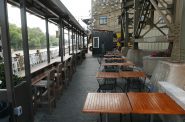 Jul 26th, 2023 by Michael Horne
Jul 26th, 2023 by Michael Horne



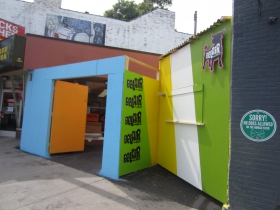
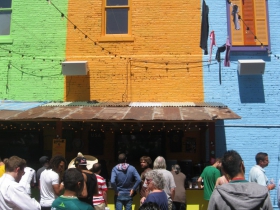
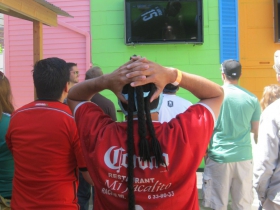
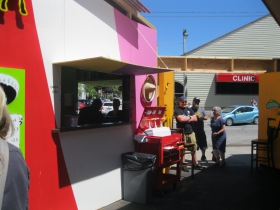
















I originally read about the The Nomad’s favella dispute on Alderman Nic Kovac’s Facebook page, where he found it harmless, but a string of Friends and commenters felt entirely differently. The Nomad has always played great world music and has masks on its walls that the owner picked up in his travels all over the world, and is a place that I see as being open to everyone. Perhaps the “even bad publicity is good publicity” phrase will work here – I see no reason that people should stop going to the Nomad, especially if they like watching the World Cup together!
I don’t recall anyone asking for a pickett of the Nomad, I do recall a boycott. Which is defined as : ˈboiˌkät/
verb
verb: boycott; 3rd person present: boycotts; past tense: boycotted; past participle: boycotted; gerund or present participle: boycotting
1.
withdraw from commercial or social relations with (a country, organization, or person) as a punishment or protest.
synonyms: spurn, snub, shun, avoid, abstain from, wash one’s hands of, turn one’s back on, reject, veto More
“they boycotted the elections”
antonyms: support
refuse to buy or handle (goods) as a punishment or protest.
refuse to cooperate with or participate in (a policy or event).
noun
noun: boycott; plural noun: boycotts
1.
a punitive ban that forbids relations with certain groups, cooperation with a policy, or the handling of goods.
synonyms: ban, veto, embargo, prohibition, sanction, restriction; More
It’s just proof that people will get offended by pretty much anything trivial…and yes, it IS trivial.